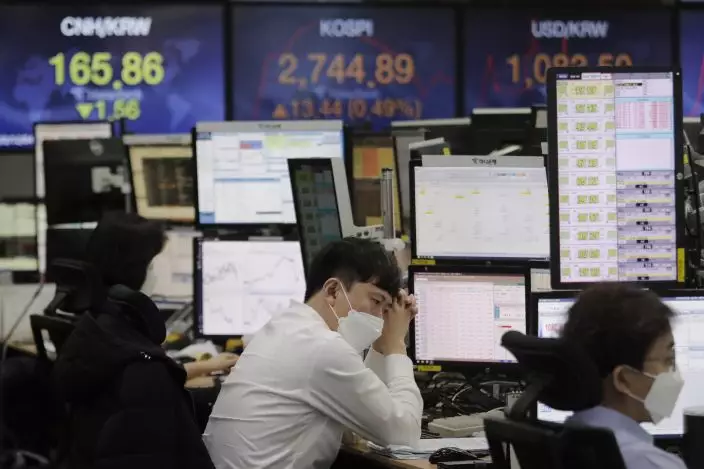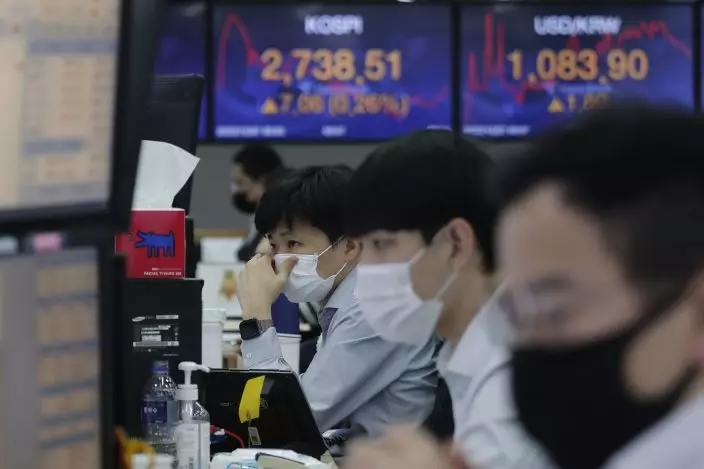Shares were mostly lower in Asia on Monday following a report that the U.S. is preparing to slap sanctions on a dozen more Chinese officials, ratcheting up tensions with Beijing.
Benchmarks dropped in Tokyo, Hong Kong and Shanghai but rose in Sydney.
Investors also are locking in recent gains after markets surged with signs of progress toward rolling out coronavirus vaccines in many countries.

Currency traders watch monitors at the foreign exchange dealing room of the KEB Hana Bank headquarters in Seoul, South Korea, Monday, Dec. 7, 2020. Shares were mostly lower in Asia on Monday following reports that the U.S. is preparing to slap sanctions on a dozen more Chinese officials, ratcheting up tensions with Beijing. (AP PhotoAhn Young-joon)
Stocks hit record highs on Wall Street on Friday as traders took a discouraging jobs report as a sign that Congress may finally move on delivering more aid for the pandemic-stricken economy.
After a strong start, Asian shares fell back, especially in China. Hong Kong's Hang Seng dropped 1.7% to 26,382.06 and the Nikkei 225 in Tokyo lost 0.8% to 26,553.85. The Shanghai Composite index sank 0.7% to 3,421.85.
South Korea's Kospi was almost unchanged, at 2,732.38 and in Australia, the S&P/ASX 200 added 0.4% to 6,662.70.

Currency traders watch monitors at the foreign exchange dealing room of the KEB Hana Bank headquarters in Seoul, South Korea, Monday, Dec. 7, 2020. Shares were mostly lower in Asia on Monday following reports that the U.S. is preparing to slap sanctions on a dozen more Chinese officials, ratcheting up tensions with Beijing. (AP PhotoAhn Young-joon)
A report by Reuters citing unnamed sources said the U.S. departments of State and Treasury were preparing economic sanctions on a dozen more Chinese official in response to Beijing's crackdown on dissent in Hong Kong.
That followed a tightening of visa restrictions on Chinese Communist Party members and their families announced late last week as tattered relations between Washington and Beijing fray further.
The decision to limit such people to one-month, single entry visas drew an accusation that the U.S. was escalating “political suppression" against China.
Wall Street closed out a solid week for stocks Friday with more record highs as traders took a discouraging jobs report as a sign that Congress will finally move to deliver more aid for the pandemic-stricken economy.
The S&P 500 rose 0.9% to 3,699.12, notching its third all-time high this week. The Dow Jones Industrial Average jumped 0.8%, to 30,218.26, also a record. The Nasdaq picked up 0.7%, to a record 12,464.23. The Russell 2000 index of smaller companies
Hopes remain deeply rooted on Wall Street that one or more coronavirus vaccines will help rescue the global economy next year. But efforts to contain a surge in new virus cases has stoked worries about more economic pain for companies and consumers.
That’s why Friday’s much weaker-than-expected jobs report perversely helped lift stocks. Investors are betting the report may be bad enough to help kick Congress out of its paralysis and deliver more support for the economy.
The data showed employers added just 245,000 jobs last month, half of what economists were expecting and a sharp drop from October’s gain of 610,000. It was the fifth straight month of slowing growth.
But markets quickly firmed amid hopes that the dour data could spur some action from Congress, which has dithered for months after much of its last round of financial support for the economy expired during the summer.
Democrats and Republicans have been making on-and-off progress on talks for another round of support for the economy, including aid for laid-off workers and industries hit hard by the pandemic.
The hope in markets is that financial support from Washington could help carry the economy through a dark winter. Surging coronavirus counts, hospitalizations and deaths are pushing governments around the world to bring back varying degrees of restrictions on businesses. They’re also scaring consumers away from stores, restaurants and other normal economic activity.
In other trading:
U.S. benchmark crude oil lost 23 cents to $46.03 per barrel in electronic trading on the New York Mercantile Exchange. It gained 62 cents to $46.26 per barrel on Friday. Brent crude, the international standard, declined 23 cents to $49.02 per barrel.
The U.S. dollar slipped to 103.98 Japanese yen from 104.16 yen on Friday. The euro rose to $1.2133 from $1.2120.


